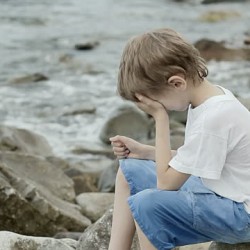As the experience with talking about death is fresh in my mind I will share how I went through the process with my boys. They are currently 13 and 15 years old. This is not the first time we have had to have this discussion. I vividly remember having a conversation about death with my boys when they were 5 and 7 after my father died. The following concepts were the ones I used in both situations:

with your kids.
- Honesty
- Show your feelings and allow your kids to see you grieve.
- Let your kids grieve in their own way and let them be a part of the ritual
- Share memories
- Allow yourself to laugh and cry
- Remember grief has no timeline
- Keep a regular routine
Be honest. With yourself and with your kids.
The most important thing to remember when talking to children about death is to be honest and dont be afraid to show your own feelings. When discussing your loss do not be afraid to use the words dead or died. Adults find using these words to be uncomfortable. However research shows that using realistic words instead of more comfortable phrases like passed away, crossed over, or lost, helps with the grieving process. When sharing information about the death follow your child’s cues. While sitting with my boys they wanted to know everything I knew about the death. It was obvious that they needed the information to help them process the loss. It also helped them to understand how to be supportive to others. Their participation and willingness to listen and talk about death has been helpful for my grieving.

Its ok to cry.
My boys were with me when I learned of the recent death. They witnessed me break down into tears. When I was able to calm myself I told the boys about what had happened. It was important for them to know why I was upset, not because the tears need explanation, but to help them understand how to mourn. My boys were obviously upset and stayed close to me. We hugged and cried together. This was an important part of the grieving process for them and for me. It is important to not hide your grief. Seeing you grieve allows kids to understand that it is ok to be sad. Children should understand that it is normal and healthy to cry after a death, it helps with healing.
Let kids express themselves (or be quiet) in their own way
Allow children to grieve in their own way. Some kids will become very quiet, some will be cry and some may become angry. It is also not unusual for kids to seem unaffected by the death. There is no right or wrong way to grieve. My boys went with me to see my friend who lost her son. The boys have known my friend their whole lives yet were very quiet during our visit. I did not push my boys to talk or interact while we had our visit. It was important for them emotionally to be there but not interact. It was their way of showing support for our dear friend and also how they were dealing with mourning. In the months to come they may or may not have more emotions only time will tell.
Share memories
Don’t be afraid to share memories of the person. It is important for the kids to be able to understand how you knew the person, what they meant to you, or how you knew them. Sharing memories will sometimes bring on emotions but this is normal. My boys did not know the person that died well but were open in sharing what memories they did have of him. This allowed for more open conversation. I shared my memories of this special person with the boys. The more kids are allowed to share their thoughts the more it will allow the grieving process to occur.
Laughing is not disrespectful when grieving! It’s healing.
Another thing to keep in mind is that it is ok to laugh. Remembering those we love does not have to be just about tears. Sharing memories and laughing is helpful in healing and is therapeutic. I often share stories about growing up with my dad. Sometimes I even replicate some of his antics for my boys, like singing “On the Road Again” every time we get in the car for vacation. It allows us to smile and remember my dad in a happy way.
Grief comes and goes, ebbs and flows, for a long time.
Be prepared for ongoing emotions for a prolonged period of time. I remember after my dad died my youngest son took longer to process then I had expected. I actually thought he was too young to fully grasp the concept that my dad, his grandpa, would no longer be around. My father’s death had occurred in April and in December I found my 5 year old son sitting on his bed crying. When I asked him what was wrong he said that he was sad because grandpa would not be with us for Christmas. It was obvious that he was still going through the mourning process and I did not even realize it. Be prepared and open and available as kids go through all the stages of grieving. There is no time limit for grieving, theirs or yours.
Death is a part of life
Losing a loved one whether they are a close family member or just an acquaintance is always difficult. Knowing that the person can no longer be with us is a complicated and painful thing to manage. Yet with time and support we learn to hold on to the happy memories. Our children learn to cry, laugh, grieve and mourn in a way that will help them heal. My boys hold a special place in their hearts for my dad, and all the loved ones that we have lost over the years. Sharing memories and grieving has made them stronger young men. They have learned about empathy through our losses. Mostly my boys have learned that life is unpredictable. Be kind, be caring, and love those around you unconditionally.



